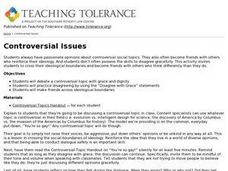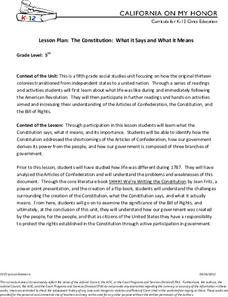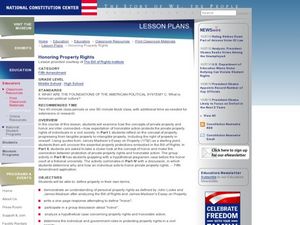Curated OER
Montgomery Bus Boycott
Students investigate the Montgomery Bus Boycott. In this American Civil Rights Movement lesson, students determine whether or not they would have taken part in the boycott and write a 5 paragraph essay about the implications of partaking.
Facing History and Ourselves
Emmett Till: Choosing to Remember
Mamie Till, the mother of Emmett Till and civil rights activist, believed that her son's murder was the last straw before public outrage over racial injustice spilled over into the Civil Rights Movement of the 20th century. A history...
Curated OER
Using High Stakes Testing to Make Students and Schools Accountable for Learning
Students conduct an informal survey about their views on high stakes testing and use basic computation skills to evaluate results as a group. They participate in activities related to high stakes testing and "No Child Left Behind"...
Facing History and Ourselves
Denial and Free Speech
Learners explore the meaning and implications of genocide. For this Armenian genocide activity, learners investigate the genocide that took place in Turkey.
Facing History and Ourselves
What is Justice After Genocide?
Students explore the meaning and implications of genocide. In this human rights lesson plan, students investigate the Aremenian genocide that took place in Turkey and the subsequent trials of the leader of the genocide held by the...
Curated OER
Activating Students
Students view and analyze one example of student activism in the 1960's and then apply their learning to their own situations. They work cooperatively to develop and implement their own "activist" or community service learning plan.
Curated OER
Word Art with King's Words
Students investigate equality and racism by creating a word art project. In this civil rights instructional activity, students discover the life of Martin Luther King Jr. and create a word art project using the Internet site Wordle...
Curated OER
Exploratory: News Casting
Pupils report on an assigned topic in a simulated news story. In this 1960s lesson, students pretend to be a reporter in the 1960s and work in groups to create a news story on an assigned topic having to do with the Civil Rights...
Curated OER
Antisemitism in Early America
Eleventh graders explore the rise of antisemitism in the United States in the early 20th century. After reading a passage concerning one man's ordeal, 11th graders discuss how the civil rights of minority groups has been viewed in...
Curated OER
Fighting for Democracy, Fighting for Me
Students consider how African American responded to social injustice. In this social injustice lesson plan, students compare and contrast the visions of Booker T. Washington and W.E.B. DuBois for obtaining civil rights for African...
K20 LEARN
Deconstructing Reconstruction: The Reconstruction Era
High schoolers examine the Reconstruction programs instituted following the American Civil War, the potential for change these efforts offered, and the realities that occurred. Guided by a PowerPoint presentation, class members read a...
Teaching Tolerance
Mass Incarceration as a Form of Racialized Social Control
Mass incarceration: A result of a tough stance on crime or racial discrimination, you decide. Academics explore the history and reasons behind mass incarcerations in the United States and its impact on ethnic communities. The...
US House of Representatives
Legislative Trends and Power Sharing Among Hispanic Americans in Congress, 1977–2012
Bilingual education, voting rights, and Congressional redistricting come up often in the news. Explore these topics from another view—the perspectives of Hispanic members of Congress. Activities include an article with comprehension and...
Delaware Law Related Education Center
Comparing Personal and Civil Responsibility in Croatia and The United States
What rights do citizens in a democracy have? Learners compare the rights of citizens in the United States and Croatia, and examine the personal and civil responsibilities that go along with those rights through a great series of...
US House of Representatives
“‘The Negroes’ Temporary Farewell,” Jim Crow and the Exclusion of African Americans from Congress, 1887–1929
Despite some advances made during the Reconstruction Era following the Civil War, the period from 1887 through 1929, African Americans serving in Congress suffered severe setbacks due to Jim Crow Laws and voter suppression. Class members...
Curated OER
Controversial Issues
Hot topics are often engaging and can get heated. High School students engage in an academic discussion were they must learn to engage with a person holding a different view than their own. They practice discussing different opinions...
Judicial Branch of California
The Constitution: What It Says and What It Means
Learners get the chance to act as representatives to the Constitution Convention, and must decide whether or not to recommend your state ratify the new framework. After examining the Constitution line-by-line, they consider their...
Facing History and Ourselves
Taking a Stand: Models of Civic Participation
How does an individual take a stand for a principle or belief? what skills are required to do so? What are the challenges and risks in doing so? Class members study examples of individuals engaging in such activities and then identify...
DocsTeach
WWI Propaganda and Art
Uncle Sam wants you! During World War II, the US government and military created a propaganda campaign to gain public support. The activity uses primary documents such as photos to explain how and why the propaganda campaign was...
Curated OER
Honoring Property Rights
Students examine the issue of cheating. In this property rights lesson, students define honor and discuss intellectual property rights as they explore a case study.
Curated OER
1856-1865: Abolitionists and the Civil War
Students explore the concept of philanthropy. In this abolition lesson, students watch "Uncle Tom's Cabin" and discuss the philanthropic acts they witnessed in the film. Students also complete an activity that requires them to determine...
Curated OER
Civil War
Students are be able to analyze primary sources (Civil War images) for examples of how soldiers are portrayed historically. They discuss what a hero is and why some individuals are heroes to certain groups while others are not.
Heritage Foundation
Procedural Rights: Amendments VI, VII, and VIII
Even in court, your class members have procedural rights provided by the amendments. Teach high schoolers this important lesson by using the 18th installment of a 20-part unit exploring the US Constitution. The resource provides several...
Curated OER
What is the Role of Civil Disobedience Today?
Young scholars examine the meaning and use of civil disobedience. They decide whether civil disobedience is a viable form of protest in contemporary times after studying the acts of Rosa Parks.

























